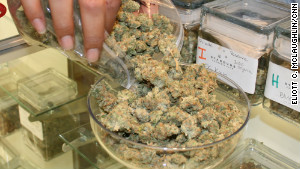(CNN) -- There appears to be a shift in the United States in favor of relaxing marijuana laws. Making pot legal, supporters say, can simultaneously provide relief for the sick and poke a hole in the operations of drug cartels. But the federal government has not acted to remove marijuana's label as a controlled substance and has reaffirmed its anti-pot policy.
Morgan Spurlock's new program, "Inside Man," premieres on CNN this weekend with an in-depth look at the medical marijuana business in California. Here are five things to know about the current debate over the drug:
There is evidence of changing attitudes in America
Public perceptions about pot have come a long way in the past decades, from the dire warnings of "Reefer Madness" to growing acceptance of medical marijuana use.
 What is a marijuana clinic like?
What is a marijuana clinic like?  Spurlock: 'I'm Harborside's newest hire'
Spurlock: 'I'm Harborside's newest hire' Laws in several states decriminalizing marijuana or allowing for medical marijuana use are one indicator of how voters feel.
Two states -- Colorado and Washington -- have completely legalized pot for recreational use.
Illinois, Ohio take up medical marijuana laws
Adrien Grenier, best known for his role in the HBO hit "Entourage," produced a documentary film that examines who the people swept up in the war on drugs really are.
He made the film, "How to Make Money Selling Drugs," as a way to "examine the hypocrisy of the war on drugs," he wrote recently.
Grenier's views reflect those of an increasing number of Americans who, polls show, see the prohibition of marijuana as a waste of billions of dollars.
"I want to make clear that I am not looking to glamorize the drug trade," Grenier wrote. "But it is important to understand that little is to be gained from stigma and demonization."
Cheryl Shuman, who calls herself the Martha Stewart of marijuana, argues that marijuana can make you a better parent and provide economic opportunities for others.
"The bottom line is cannabis is here to stay, the toothpaste is out of the tube," Shulman told CNN's Piers Morgan.
But not all are convinced.
Last year, John Walters, who directed the White House Office of National Drug Control Policy from 2001 to 2009, told CNN that decriminalization is "utterly self-defeating" and would cause more crime.
Melissa Etheridge: Pot got me through
The cost of prohibition remains high
It is estimated that $7.6 billion is spent annually by state and local justice systems on marijuana arrests, according to advocacy group NORML.
Advocates of reforms say instead of spending this money on enforcement, the government could spend it elsewhere and tax marijuana to reap even more for its coffers.
Indeed, taxing pot could raise hundreds of millions of dollars, but there is no guarantee that it would be a moneymaker for states.
The financial gains in Washington and Colorado, the two states that have legalized marijuana, have not been as great as some expected.
Washington had projected up to $450 million in added annual tax revenue, but the state's new pot consultant figures it could be little more than half that.
In Colorado, the Colorado Futures Center think tank forecasts $130 million in new tax revenue but thinks that won't even cover the cost of regulating the new industry.
Still, some say the legalization of pot would bring down the black markets that have left a murderous trail, drawing parallels with what happened during and after the prohibition of alcohol in the 1920s and '30s.
Estimates vary widely on how big a hit drug cartels would take if marijuana were legalized. While U.S. officials said in 2009 that 60% of cartel revenue came from weed, the RAND Corp. said the following year that "15-26 percent is a more credible range."
A report this month by the Mexican Competitiveness Institute predicted Mexican drug organizations, specifically the Sinaloa Cartel, could lose almost $2.8 billion just from the legalization votes in Colorado and Washington.
Marijuana: The next diabetes drug?
Studies cite medicinal benefits of marijuana
The wall of prohibition began to show cracks when it became accepted that marijuana has medicinal uses.
Medical marijuana dispensaries have clients who suffer ills ranging from cancer to AIDS to chronic pain. Proponents say the drug's pain-relieving properties offer an alternative for cancer patients undergoing chemotherapy or radiation treatments.
Opponents, however, say that science has yet to prove that marijuana is safe.
A series of trials published by the University of California Center for Medicinal Cannabis Research last year showed cannabis can help patients suffering from neuropathic pain, commonly caused by degenerative diseases like multiple sclerosis or fibromyalgia. Neuropathic pain is also a common side effect of chemotherapy and radiation.
Study participants on cannabis reported a 34% to 40% decrease in pain, compared with the 17% to 20% decrease seen in patients on a placebo drug.
The National Institute on Drug Abuse, meanwhile, says that marijuana causes an increase in heart rate, which could put users at risk for a heart attack or stroke. Marijuana smoke also contains carcinogens similar to those in tobacco smoke.
Jason David, whose son Jayden suffers from seizures, turned to the drug and calls it "miracle marijuana."
Jayden has Dravet syndrome, a rare and catastrophic form of childhood epilepsy. The boy started taking a liquid, nonpsychoactive form of marijuana, which his father says controls his violent seizures. This form ensures that Jayden does not get high from the drug, his father says, but has allowed him to enjoy the things other boys do.
Seattle's budding economy: Pot tourism
Medical marijuana dispensaries are not what you imagine
Spurlock said he imagined that marijuana dispensaries -- the places where patients can purchase medical pot -- would be shady places. What he found at Harborside Health Center, the largest dispensary in the country, surprised him.
The space was large and clean, nicer than many health clinics he has been to, Spurlock said. Tight security regulated who could enter the business, which sells various strains of marijuana and lotions, pills and other products derived from the drug.
Some strains of marijuana are known to be more cerebral and energizing, while others are more sedative in nature and have greater pain-relieving properties. Dispensaries such as Harborside categorize their products accordingly and have specific strains for different ailments.
Marijuana laws put state and federal statutes at odds
Eighteen states have either decriminalized or allowed medical marijuana in some fashion. While the state laws have allowed dispensaries to open, they remain illegal under federal law. The gap between state and federal laws is widening when it comes to marijuana enforcement.
For instance, state law makes it legal to possess marijuana in Washington state, but selling drugs is still a federal crime. There is a similar situation in California, where medical marijuana is allowed, but again, growers don't have the same legal protections that users have.
Pot smokers in Washington celebrated in Seattle's Space Needle by toking up as the law legalizing weed went into effect, but growing and selling it remain felonies.
"So I'm not sure where you're supposed to get it," King County Prosecutor Dan Satterberg said when the law went into effect. "If you stumble across some on the street or it falls from the sky, then you can have it. Otherwise, you are part of a criminal chain of distribution."
In 1996, California voters approved Proposition 215 to exempt doctors and seriously ill patients from marijuana laws and allow them to grow and use it in treatment. But government crackdowns on growers since then have led to multiple lawsuits.
Harborside, the dispensary that Spurlock visited, is fighting to remain open amid efforts by the feds to shut it down.
{ 0 comments... read them below or add one }
Post a Comment